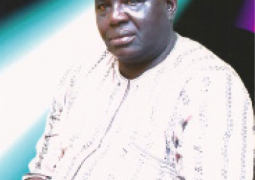The Vice President and minister for Women Affairs, Aja Dr Isatou Njie Saidy, yesterday presided over the commemoration of this year’s World AIDS Day, where she renewed the government’s commitment in the fight against AIDS.
The commemoration, on the theme “Universal Access and Human Rights”, was held at July 22nd Square in
In her statement, Vice President Njie Saidy said that the government will continue to create and nurture an enabling environment with none discriminatory social and political structures that put HIV infected people at higher risks, in particular the young ones.
“Government will continue to ensure that everyone that needs HIV prevention, treatment, care and support will have access to condoms, voluntary counseling and testing, safe blood supply, provision of drugs that prevent pregnant women from infecting their children during pregnancy, at birth or during breastfeeding,” she said, calling on the private sector to increase its support towards the fight against HIV/AIDS.
According to the Vice President, despite the daunting challenges, the
“According to results, the sentinel surveillance, the national prevalence of HIV1 increased from 1.4% in 2007 to 1.6% in 2008, whereas HIV2 declined from 0.6 percent in 2007 to 0.4 percent in 2008,” she stated.
She pointed out that over 1,600 persons with advance HIV infection are receiving ART, whilst over 300,000 orphans and vulnerable children are receiving free basic external support (school fees and nutritional support).
Alieu Jammeh the Director of the National AIDS Secretariat said the protection of human rights is fundamental to combating the global HIV and AIDS epidemic, adding that violations against human rights fuel the spread of HIV, putting marginalized groups at higher risk of HIV infection.
According to the NAS Director, promoting individual human rights can prevent new infections and enable people living with HIV to live free from discrimination.
World AIDS Day, he added, provides an opportunity for all individuals, communities and political leaders to take actions and ensure that human rights are protected and global targets for HIV/AIDS prevention, treatment and care are met.
Speaking earlier, Dr Thomas Sukwa, World Health Organization country representative in the
However, he noted that the rate at which new infections are occurring is still very high and remains a matter of great concern.
Dr Sukwa urged countries to protect the basic human rights of people living with HIV/ AIDS including their right to employment, access to financial services and other basic conditions that would enable them to fulfill their social and economic needs.
Fatim Gai, President of GAMNAS, said globally 33.3 million people are still living with HIV, including women and children who are the most affected.
She used the occasion to call on all partners to train more health care workers such as doctors, nurses, lab technicians and pharmacists to improve quality service delivery at health facilities in any part of the country.
Read Other Articles In Article (Archive)
3 Agric officials case fails to proceed
Mar 17, 2015, 10:07 AM




